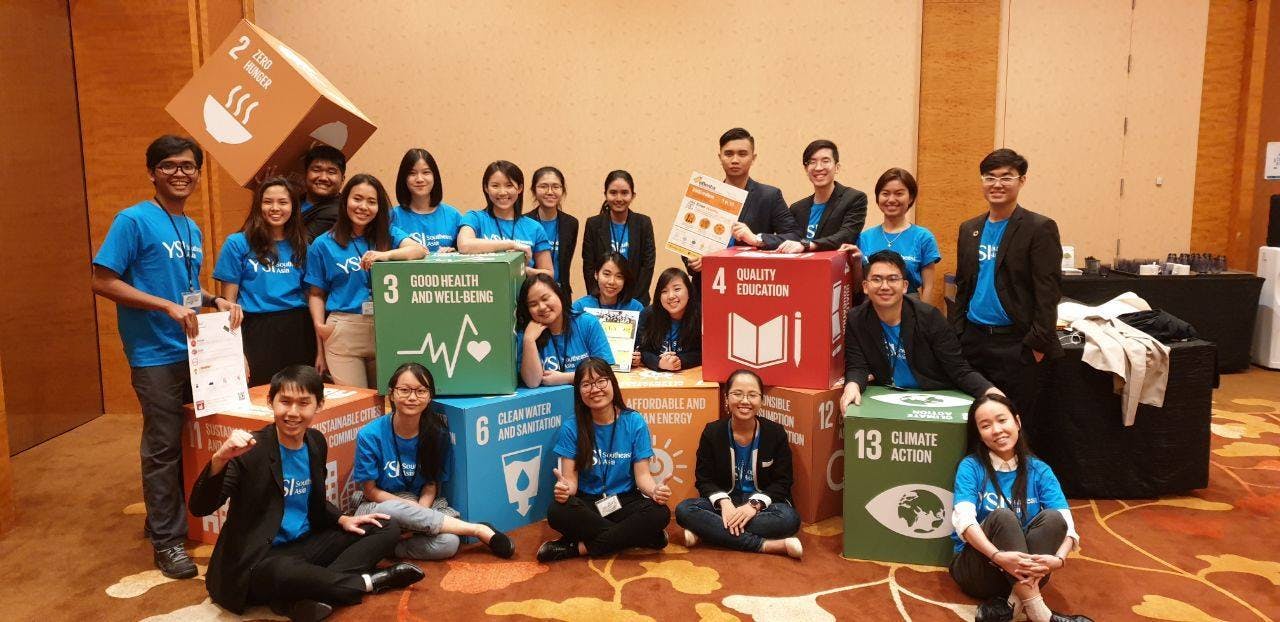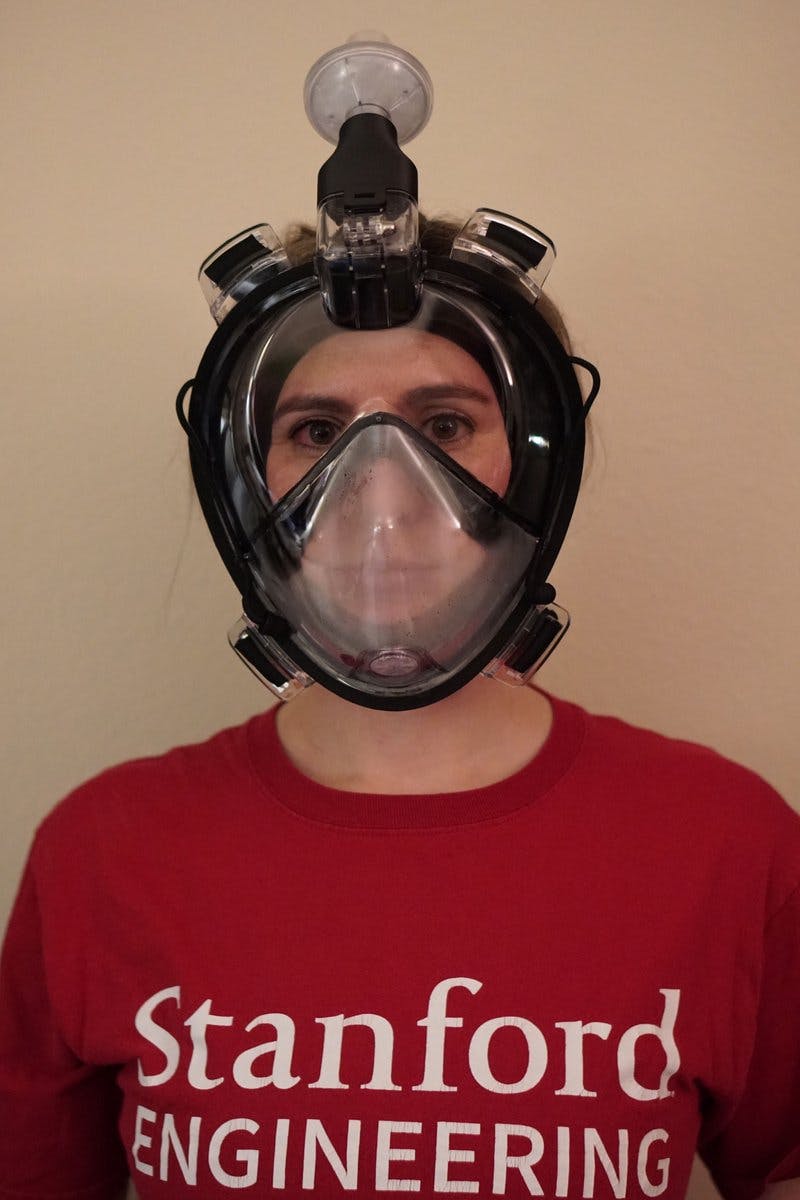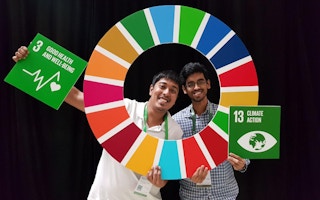Sai Surya Yarlagadda and Irsyad Ramthan founded Young Sustainable Impact Southeast Asia (YSI SEA) in 2017, when they were engineering students at National University of Singapore (NUS).
To continue reading, subscribe to Eco‑Business.
There's something for everyone. We offer a range of subscription plans.
- Access our stories and receive our Insights Weekly newsletter with the free EB Member plan.
- Unlock unlimited access to our content and archive with EB Circle.
- Publish your content with EB Premium.
YSI SEA is a social enterprise born out of an idea that started in Oslo, Norway to encourage youths around the world to start sustainability ventures, using the United Nations’ Sustainable Development Goals as a framework.
The duo’s inspiration to launch YSI SEA came to them after seeing 10,053 young entrepreneurs—which YSI calls ‘earthpreneurs’—from 170 countries apply for 25 slots on YSI’s online innovation programme.
Yarlagadda and Ramthan recognise that Southeast Asia has its own unique set of sustainability problems, which is why YSI SEA aims to empower youths to launch businesses that solve problems in their own countries.
The organisation focuses on energy transition, food and agriculture, and the circular economy, and is backed by Temasek Foundation Ecosperity, the philanthrophic arm of state investment firm Temasek.
Over the course of three years, YSI SEA has built a community of 13,000 young entrepreneurs, and incubated 27 startups. One of them is Farmability, which aims to tackle poverty and plastic pollution in the Philippines by enabling rural communities to upcycle agricultural waste into sustainable packaging.
We needed to convince private players that we know how investments work. This was hard to do as we are students.
Sai Surya Yarlagadda
In this interview with Eco-Business, Yarlagadda and Ramthan talked about the challenges they faced as students in the innovation sector, how young people can have impact, and what sort of future they imagine their children will live in.
What sparked your interest in sustainability?
Yarlagadda: I was born in a small village in India and moved to Singapore at the age of five. It was a real culture shock moving here and observing how people interacted with natural resources. Because of this, I decided to pursue mechanical engineering and economics to understand how resources are distributed differently around the world, and to find ways to help places which lack access to fundamental resources. I have come to realise how intrinsically linked social and economic issues are with environmental ones.
Ramthan: I studied biomedical engineering because I felt that access to healthcare was a universal need. When Surya approached me to be a part of YSI SEA, one of my missions was to make sure people understood that the concept of sustainability is not just about the environment, but also social issues like healthcare.
However, being in the sustainability space for a while has changed my perception of sustainability and made me transition from really wanting to solve solutions in the healthcare sector, to shifting to other aspects of sustainability. It was because of this exposure that I realised my pursuit of a master’s in biomedical engineering was not the direction I wanted to go in.

YSI Southeast Asia’s 2019 cohort for their innovation programme. Image: YSI SEA Facebook page
What are some of the challenges you face setting up a sustainability organisation?
Yarlagadda: It was clear that we wanted to take on the role of an ecosystem builder, instead of a sustainability startup with a single product.
One challenge we faced at the start was to gain legitimacy and the trust of professionals from the ground up. We needed to convince private players that we could incubate start-ups and that we know how investments work. This was hard to do as we are students.
What drove us was the willingness to commit to the long term, and knowing how to acknowledge the things we do not know and learning from the experts we meet along the way.
Do you foresee yourselves taking sustainability as a career path?
Ramthan: I am currently operating YSI SEA full-time. My involvement in the organisation opened my eyes to the sustainability space and made me realise the need for more resources allocated in the sustainability space. I foresee my current and future pursuits to making sustainability possible, specifically in the region first.
Yarlagadda: I went to university with the intention of building myself up for a career in sustainability. To me, this is an unconventional path that should be taken, because at the end of the day, I think my passion in sustainability should merge with my area of academic interest. I have an interest in renewable energy, and I think engineers play a very important role in the energy transition. I see myself working in the clean energy sector.
“
The decisions we make now will shape the world for our children.
Irsyad Ramthan
What advice do you have for other youths who want to have impact?
Yarlagadda: Sustainability can be complex and daunting, as there are many aspects to it. What helped me was to focus on one area I was passionate about—and go for it. It is important to understand the space, and act within the space.
The next thing is to build a network of supportive people who believe in the same causes. It is useful to have them around you to remind you of what is important and to keep you motivated.
It is also important not to fall into an echo chamber and turn to the sustainability community for everything. We should consult with the people outside our own sphere of influence and try to empathise with their opinions and perspectives. This helps you to stay grounded and optimistic.
Which sustainability role models do you look up to?
Ramthan: Our executive mentors at YSI SEA are Chow Yen-Lu, executive chairman of WholeTree Foundation and Leon Toh, founder and executive director of Damson Capital. They really challenged us to become an independent organisation. I really respect them because even though they are busy individuals, they still give their time in advising us. I really value the sustainability space because even if people do not agree with your idea, they are still willing to help you out. I find that heart warming.

Manu Prakash’s lab at Stanford Engineering made an anti-viral face mask from scuba gear. Image: Stanford Engineering
Another person I admire in the sustainable social innovation space is Professor Manu Prakash from Stanford University. He runs a lab that upcycles low-cost materials to build tools. He made a $1 microscope, and recently made an N95 mask out of a cotton candy machine and some polymers. Innovation is about resourcefulness, but it is also about giving the right tools and opportunities to the people who face these issues. We need to give them a voice, and allow them to create the tools that enable them to innovate around sustainability as well.
Which companies do you admire for their approach to sustainability and why?
Yarlagadda: I really admire Ørsted. Just a decade ago, they were one of the most fossil fuel-intensive companies in Europe. Today, they are the global leader in renewable energy and were ranked the most sustainable company in the world earlier this year. It is inspiring because they exemplify how fossil fuel companies can make the transition to be more sustainable without hurting their financials.
Another company I admire is Circular Blueprint, a circular economy startup in Singapore. Their vision is to upcycle plastic waste into eco-friendly building materials to make housing affordable and safer for people who lack access to proper housing. Their vision shows that they understand not only the environmental impacts of plastic waste, but also the social and economic impacts.
What do you think the future will be like for our children?
Yarlagadda: I hope the challenges the next generation face are not the direct result of the comfortable lifestyle we enjoy now. Our generation will face the burden of societal, environmental, and economic issues that Covid-19 has exacerbated, but it is an intergenerational burden. Our children will join this transition towards a more sustainable world. Our role in the future as parents is to nurture the right mindset to tackle these challenges.
Ramthan: I am cautiously optimistic about the future. I know that the decisions we make now will shape the world for our children. In the context of Singapore, I predict that things are going to be quite closed off, not just physically as we build walls to adapt to climate change, but also in our relationships with our neighbouring countries. I will dedicate my time to preventing this from happening.
Tell us about your next event?
Ramthan: On the 23rd of July 2020, we will be hosting YSI SEA Virtual Demo Day 2020. This event will present 23 regional impact entrepreneurs selected from 1140 candidates and their solutions to pressing sustainability challenges in Circular Economy, Energy Transitions, and Food & Agriculture.














